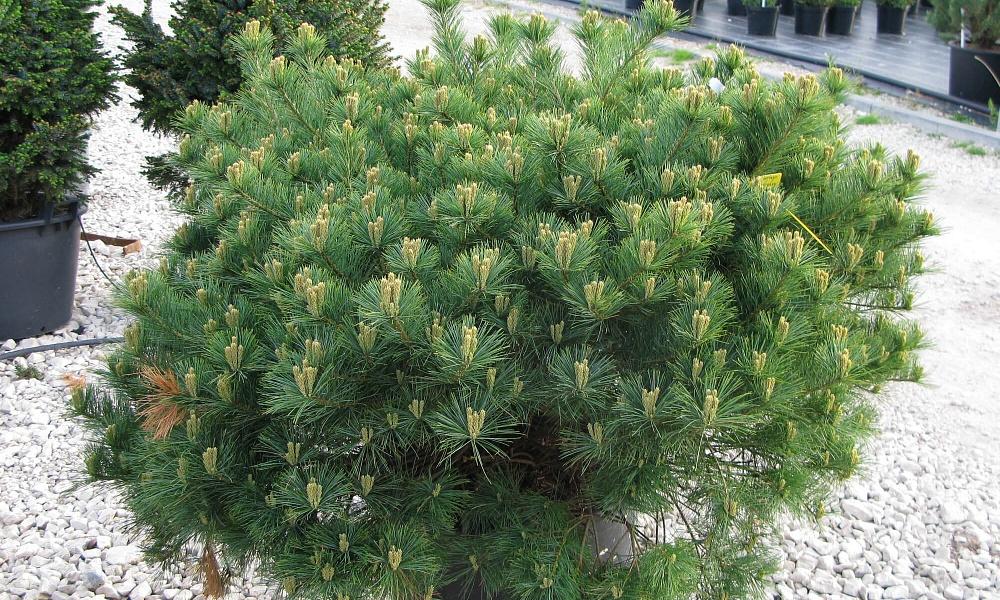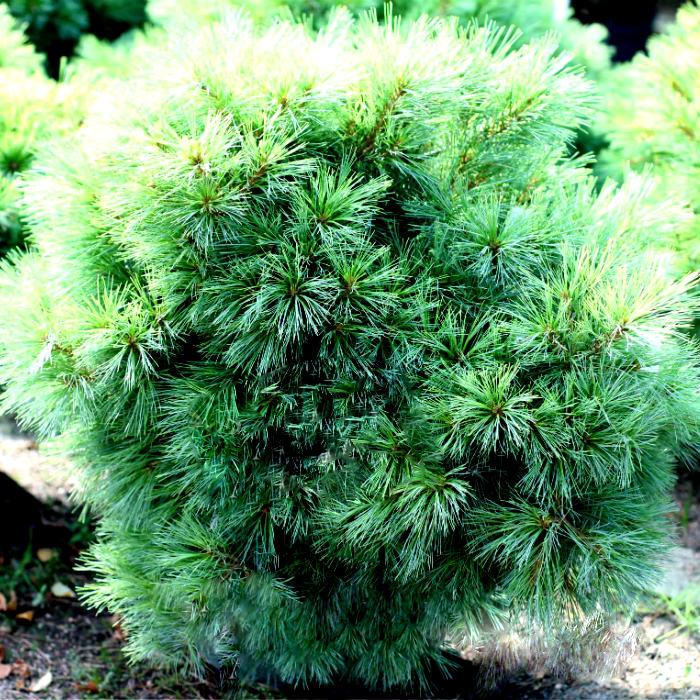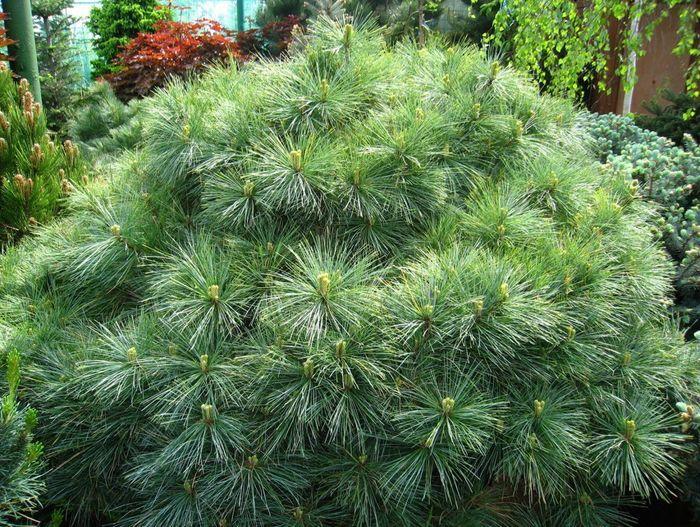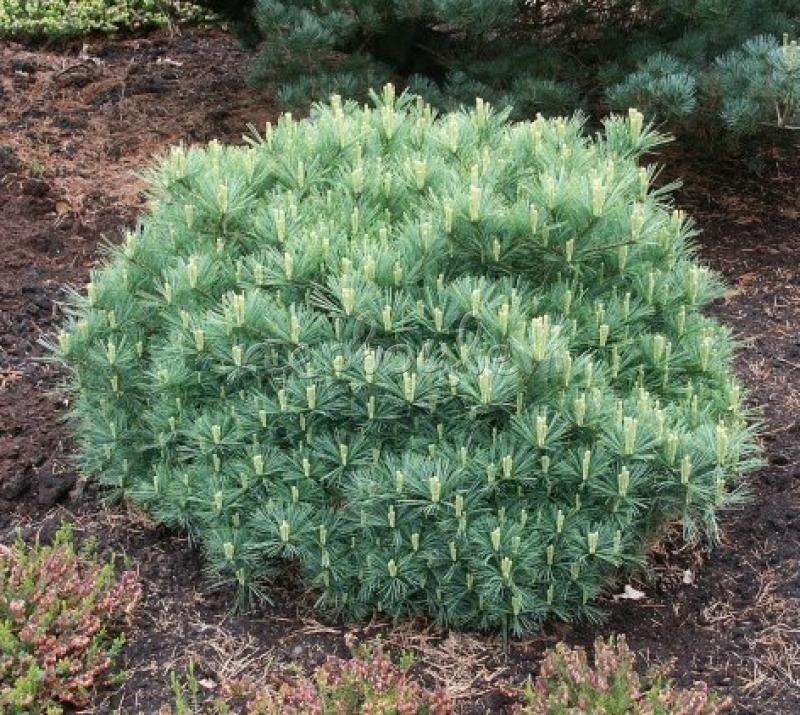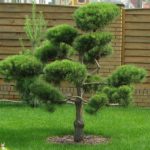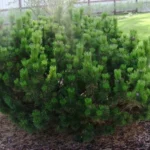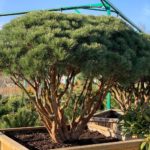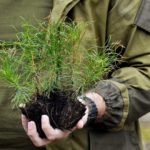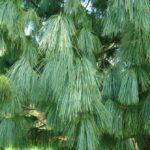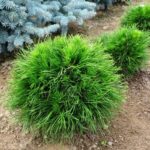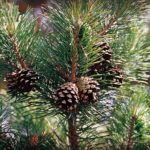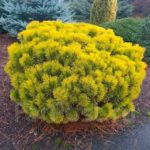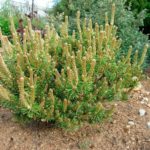Weymouth pine Minima is a popular variety that is well suited to collectors and gardeners. This plant is an evergreen shrub that usually does not exceed 1 meter in height. Often there are spherical plants that are suitable for decorating alpine slides and topiaries. The plant is decorated with bright green needles, which acquire a bluish color by autumn.
Description of the tree
This crop began to be grown in 1923. This is a dwarf variety that has thin and hard needles measuring 2.5 centimeters. They are not straight, but slightly curved. The needles of this plant are characterized by a dark green color. At the end of summer it turns bluish.
An evergreen dwarf tree usually does not exceed 1 meter in height. It is characterized by a spherical crown. As the culture develops, it becomes cushion-shaped. The width of the tree usually exceeds its height. The diameter of the crop reaches 1.5 meters.
This plant is characterized by thin shoots of a green-brown or red-brown hue. They are complemented by narrow cylindrical cones that have a light brown tint. The length of the cones reaches 20 centimeters, and the width - 4.
This culture is characterized by the following distinctive features:
- wind resistance;
- love of light;
- slow development - annual growth is 5-7 centimeters;
- high resistance to frost;
- persistent immunity to diseases;
- the need for fertile and moist soil that has a neutral or slightly acidic pH reaction;
- no need for regular pruning.
Where is it used?
This dwarf pine has a neat and attractive shape. Therefore, it is often used to decorate garden plots. The Minima variety helps give the site an attractive appearance.
Landing requirements
To successfully grow pine, you need to choose a high-quality site and strictly follow the rules for planting. It is important to consider that the crop needs sufficient lighting. The tree can withstand partial shade, but at the same time loses its decorative effect.
Before planting, it is important to monitor the depth of groundwater. It must be at least 1.5 meters. Buildings or other crops are required to maintain a spacing of at least 1.5 meters.
Preparation and selection of seedlings
You need to buy seedlings in specialized stores or nurseries with a good reputation. It is not worth purchasing such plants by hand, since you may end up with a variety that is not the one you expected. In addition, such seedlings can be infected with diseases or parasites.
Seedlings can have an open or closed root system. The second category adapts better to a new place. When purchasing plants with an open root system, it is recommended to immediately assess its condition. It is important to give preference to plants with the strongest and healthiest roots.
When purchasing a pine seedling, it is important to study the description of a quality plant:
- shoots bend well;
- the needles have a uniform shade and do not fall off;
- there are no signs of rot, damage or insect attacks on the trunk;
- the roots look healthy and well developed.
Where to plant a tree
Planting work is recommended to be done in spring or autumn. In the first case, the bed needs to be prepared in the fall. If you plan to plant in September or October, this can be done 2-4 weeks in advance.
At the preparatory stage, the soil must be cleared of plant residues and dug deep. After which you need to make a hole 70-90 centimeters deep. The width should be comparable to the size of the roots.The soil removed when digging a hole should be mixed with sand and 40-50 grams of nitroammophoska.
If necessary, you can reduce the acidity level by adding lime. A drainage layer should be placed at the bottom of the recess to remove excess moisture.
Step-by-step instruction
To carry out planting work correctly, it is recommended to do the following:
- Pour fertilized soil onto the drainage and form a small mound.
- Place a seedling in the central part. At the same time, it is important to maintain the integrity of the soil clod.
- Fill the voids with substrate. When planting a plant, it is important to ensure that the root collar is flush with the ground surface.
- Water the plant.
- Shade the crop to protect it from aggressive sunlight.
What you need to know about care
An adult plant does not require specific care. Careful adherence to the rules of agricultural technology is required only for young plants 4-5 years old. After the tree adapts to new conditions, the root system will begin to develop quickly, and therefore the plant will not require special human intervention.
Weymouth pine Mini requires standard care, which includes watering, fertilizing, weeding, loosening and mulching. It is also important to pay attention to the prevention of disease development and pest attacks.
When to water and feed
It is recommended to water young pines at intervals of 2-3 weeks. For 1 plant it is worth using 10 liters of water. Mature trees are watered only during prolonged drought. The rest of the time, well-developed roots can independently extract water and nutrients from the soil.Trees need abundant watering in the spring and before the start of winter. In summer, the crop requires sprinkling of the crown.
Pine of this variety does not require mandatory fertilization. To speed up the growth and development of the crop and strengthen its immunity, young trees should be fed with a combined mineral fertilizer, which is intended for coniferous plants. It is important to strictly follow the instructions.
Mulching and loosening
In order for the plant to develop normally, it is important to regularly loosen and mulch the tree trunk circle. Systematic soil weeding is of no small importance. The soil should be loosened after each watering and precipitation. This will help prevent the appearance of a dense crust on the surface, which impairs the permeability of the soil to water and air. It is important to consider that the beds need to be loosened to a shallow depth, since pine has a shallow root system.
Mulching is carried out to maintain optimal soil moisture parameters, stop the development of weeds, and reduce the number of waterings, loosening and weeding. Sawdust and peat are ideal for this procedure. In the fall, the mulch must be changed.
Crown formation
Minima pine naturally has a beautiful spherical or cushion-shaped crown. However, it usually does not require human intervention. If required, shoots can be pinched. This will help achieve the ideal shape of the tree.For this purpose, it is necessary to pinch out young shoots with the arrival of spring.
Preparing for cold weather
This crop is highly resistant to frost. Therefore, an adult plant does not need to be prepared for winter. Only young seedlings need attention. After the first frost, it is recommended to wrap them in burlap or other non-woven material that allows air to pass through.
Pine diseases
Weymouth Pine Mini has strong immunity. It can suffer from diseases or pests only if planting work is carried out incorrectly or the rules of agricultural technology are violated. The plant most often encounters rust. With the development of this pathology, orange bubbles form in the lower part of the crown.
To prevent the occurrence of this disease, it is recommended to spray the plant in the spring with any copper-based product. A solution of copper sulfate or Bordeaux mixture is perfect for this purpose. An equally good option would be “Rogor”.
Young seedlings often suffer from shutte. As this pathology develops, the needles begin to turn yellow and fall off. To prevent disease, the tree needs to be fed with organic matter and watered. In this case, fallen needles must be removed immediately. If pathology develops, the tree must be treated with Bordeaux mixture. A solution of colloidal sulfur with a concentration of 2% is also suitable for this purpose.
Weymouth Pine Mini is an attractive ornamental crop that is compact in size and perfectly complements any garden plot. In order for a plant to develop normally, it needs to be provided with complete and high-quality care. High-quality protection from diseases and pests is of no small importance.

